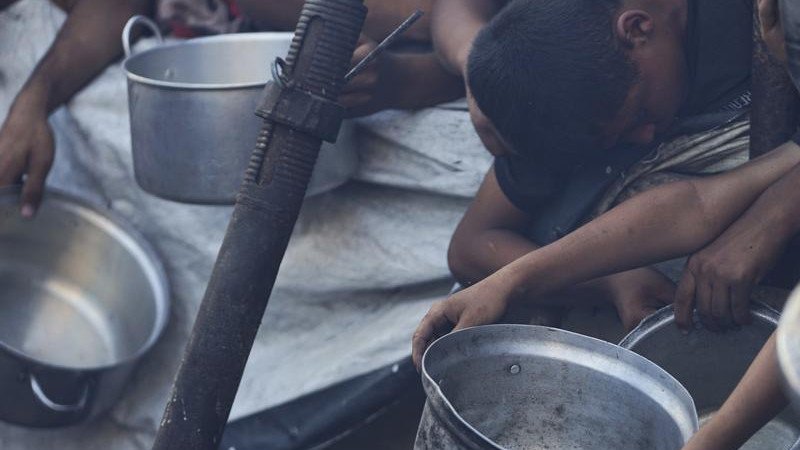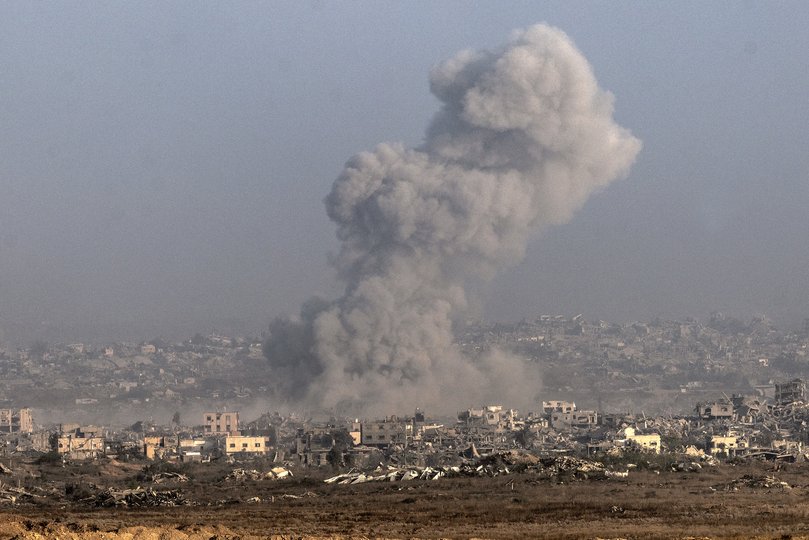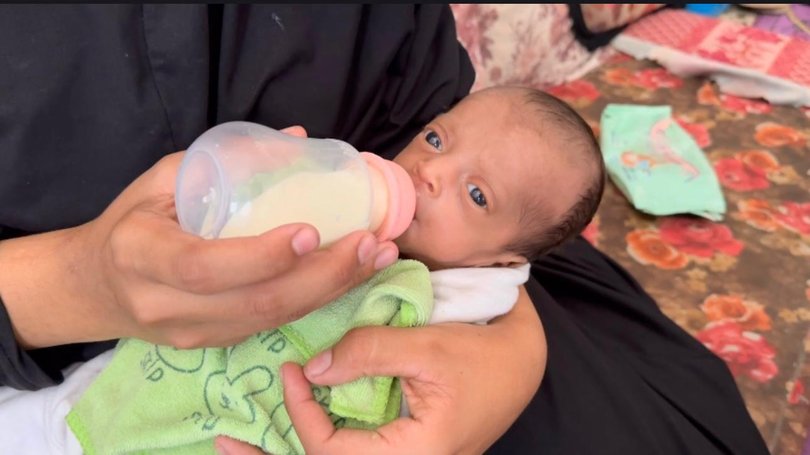Gaza’s health system crumbles under siege with rising child malnutrition and starvation deaths amid blockade
THE WASHINGTON POST: After nearly four months of an Israeli siege, Gaza’s hospitals are flooded with severely malnourished children, many the size of their bones, as medical staff collapse from exhaustion.

After four months of a near-total Israeli siege, Gaza’s few remaining hospitals now have wards for the growing number of malnourished children whose tiny bodies are just the width of their bones.
Doctors are famished to the point that they have dizzy spells as they make their rounds, medics say, and the journalists documenting their caseloads are often too weak to even walk to the clinics.
For months, aid agencies had warned of the coming crisis, as Israel halted the flow of aid to the Gaza Strip before attempting to replace UN relief efforts with distribution points inside military zones.
Sign up to The Nightly's newsletters.
Get the first look at the digital newspaper, curated daily stories and breaking headlines delivered to your inbox.
By continuing you agree to our Terms and Privacy Policy.It was a move Israeli officials said was aimed at pressuring Hamas, whose fighters attacked Israel on Oct 7, 2023, and continue to hold about 50 hostages who were abducted that day, about 20 of whom are still believed to be alive.
But testimonies from doctors, relief workers and Gazans this week make it clear that a worst-case scenario is finally unfolding: Nearly 1 in 3 people are going multiple days without eating, according to the United Nations, and hospitals are reporting rising deaths from malnutrition and starvation.
In a video filmed Tuesday inside Nasser Hospital in southern Gaza, families fretted over babies with distended bellies and tiny fists that they clenched as they cried.
In one of the newly established malnutrition rooms, the mothers and children were so quiet that the loudest sound came from a pair of fans that beat weakly in the cloying heat.
The Gaza Health Ministry said Wednesday that 10 people had died of starvation in the previous 24 hours, bringing the total number of those killed by hunger to 111 since the start of the war.
Among them was 6-week-old Yousef al-Safadi, so small in photographs from the silver table of the hospital morgue that the white sleepsuit peeled back to show how his jutting ribs dwarfed his slight body.
The International Rescue Committee, a global relief and development organisation, said Wednesday that its teams had reported an increase in the number of children being rushed to hospitals because of malnutrition in recent days.
“Their small bodies are shutting down. They can’t breathe; their immune systems are collapsing,” said Scott Lea, the organisation’s acting country director for the Palestinian territories.
Tess Ingram, a spokeswoman for the UN children’s agency UNICEF, said rising rates of child malnutrition were preventable, but that the health care system needed to treat it was “running on fumes or hit by strikes.”

“These numbers are rising fast because children are being denied enough food, water and health care. It’s as simple as that,” she said.
Throughout the war, which has killed more than 59,000 people in Gaza, according to the local health ministry, which does not distinguish between civilians and combatants, Israel has imposed severe restrictions on the amount of food and other aid entering the enclave. At times, it allowed more trucks to enter, including during a six-week ceasefire earlier this year.
But on March 2, Israel reimposed its blockade, lifting it only partially in May after Israeli Prime Minister Benjamin Netanyahu said “pictures of mass starvation” could cost his country the support of the United States and other allies.
In a briefing with reporters on Wednesday, an Israeli military official said there was a “lack of food security inside Gaza,” but blamed a failure to distribute aid on the UN.
“There is no limit. The crossings are open - just bring the trucks and take the aid,” he said, speaking on the condition of anonymity, in line with the rules of the briefing.
“We’re seeing the pictures also, and I want to tell you that we are taking it very seriously,” he said. “We are analyzing the number of calories per capita inside Gaza.”
The UN says Israeli authorities are the “sole decision-makers” on who, and how much, aid enters Gaza, as well as the type of supplies that are allowed in.
“Once inside Gaza, movement requires navigating an obstacle course of coordination with Israeli forces, through active hostilities, traveling on damaged roads, and often being forced to wait at holding points or pass through areas controlled by criminal gangs,” UN relief chief Tom Fletcher told the UN Security Council in New York last week. When vehicles do make it through, he said, starving people often try to grab flour from the backs of the trucks.
Gaza’s ability to make its own food has been almost entirely destroyed as Israeli military operations have wiped out farmlands and factories. As the summer heat bears down, hungry and thirsty civilians have run out of reserves to fall back on.
Palestinians in the enclave are reliant instead on humanitarian aid that most people under Israel’s new system cannot easily access. According to local health authorities, more than 1,000 people have been shot dead as they raced through territory controlled by the Israeli military toward distribution points run by US security contractors, where supplies are first-come, first-served.
When victims of Israeli strikes, shelling or gunfire reach the hospitals, photographs show, their bodies are often visibly emaciated.
In Gaza City’s Sabra district, Ayat al-Soradi, 25, said she was so malnourished during her pregnancy this year that she gave birth to her twins, Ahmed and Mazen, two months early. They each weighed about two pounds, and for almost a month, she had watched over them in their incubators as the nurses fed them with powdered milk.

But even the hospital staff were running out of food. The flour, milk, eggs and meat that were available during an earlier ceasefire had disappeared from the market. A bag of flour and lentils could fetch almost $200.
In WhatsApp groups, Palestinian families bartered for baby formula like the one doctors recommended for Ahmed and Mazen. The family could barely afford it once the twins were discharged. Ahmed died 13 days later. “He was 2 months old,” Soradi said. And feeding Mazen alone was still a struggle.
His baby formula was almost prohibitively expensive, when the family could find it at all, Soradi said. She mixed it with rice water to make it last longer, but the child barely grew. Ten days ago, he was readmitted to the hospital at a weight of 6.6 pounds as he ran a fever and struggled to breathe.
Relief workers say parents throughout Gaza regularly forgo meals, and sometimes days’ worth of food, to feed their children. When there is still nothing in the cupboards, they find a way to explain why no one eats.
In Deir al-Balah, Taghred Jumaa, a 55-year-old women’s rights activist who described herself as relatively better off than most Palestinians in Gaza because she still had a salary, said that rationing the family’s food meant her hair was falling out. Parts of her body felt numb, she said.
In the northern district of Sheikh Radwan, relatives of 2-month-old Sham Emkat said Wednesday that she had been pronounced dead at 11:30 p.m. the night before in al-Rantisi Hospital. They were still waiting for her death certificate, said Ekram Emkat, the child’s aunt.
“I’m sorry, Sham’s mother is in a very bad condition,” she said, adding that the girl weighed less than four pounds when she died. Sham was so small that the family could count her bones.
In an open letter published Wednesday, 115 organizations, including Doctors Without Borders, Mercy Corps and Save the Children, said Israel’s blockade and ongoing military operations were pushing Gaza’s more than 2 million people, including relief workers, toward starvation.
Juliette Touma, a spokeswoman for the UN agency for Palestinian refugees, said that colleagues had begun receiving “SOS messages from staff who are hungry themselves, who are exhausted themselves.”
In conversations with Washington Post reporters this week, doctors, health officials and aid workers have all apologized for their lack of focus, citing hunger.
Many were surviving on lentil soup only, said Ahmed al-Faraa, director of the Nasser Hospital’s pediatrics wing. During an interview Wednesday, Eyad Amawi, director of al-Aqsa Martyrs Hospital in Deir al-Balah, apologized and said he needed to pause because of a headache and dizziness.
His family of six had obtained two kilograms (about 4.4 pounds) of flour the day before, he said, which he estimated would last a day and a half. “The main problem is that you are all of the time busy, thinking about where and how we can obtain any amount of food,” he said.
Amawi said he had lost 15 pounds since the war began; others have lost more. Doctors and nurses were struggling to work long shifts on empty stomachs. Some “have not been able to stand,” he said.
In a statement this week, a group of journalists from the Agence France-Presse news agency warned that the Israeli blockade and subsequent hunger crisis had made conditions for their Palestinian colleagues in Gaza “untenable.”
The AFP’s principal photographer, identified as Bashar, had posted to his Facebook page, saying that he no longer had the strength to work. Other colleagues were starting to say the same.
“Over the last few days, we have learned from their brief messages that their lives are hanging by a thread and that the courage they have shown for months to bring news to the world will not be enough to pull them through,” the statement read.
“Since AFP was founded in August 1944, some of our journalists were killed in conflict, others were wounded or made prisoner, but there is no record of us ever having had to watch our colleagues starving to death.”
© 2025 , The Washington Post
